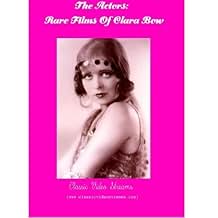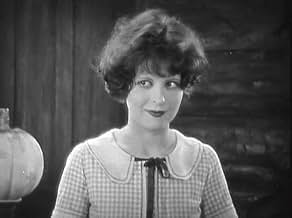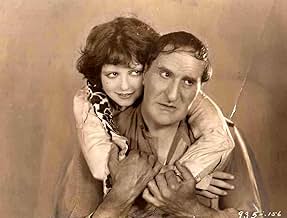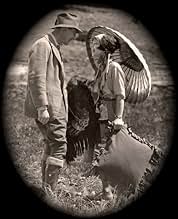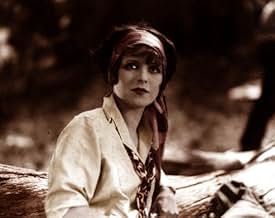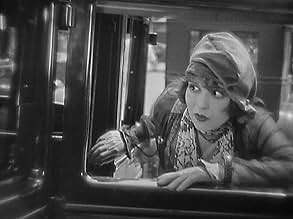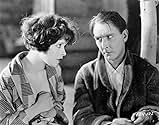Agrega una trama en tu idiomaA sexy young manicurist living with her older backwoodsman husband in a small Canadian town finds herself attracted to a young, rich and famous divorce lawyer who comes to town on vacation.A sexy young manicurist living with her older backwoodsman husband in a small Canadian town finds herself attracted to a young, rich and famous divorce lawyer who comes to town on vacation.A sexy young manicurist living with her older backwoodsman husband in a small Canadian town finds herself attracted to a young, rich and famous divorce lawyer who comes to town on vacation.
- Dirección
- Guionistas
- Elenco
- Premios
- 2 premios ganados en total
Chief John Big Tree
- Indian
- (sin créditos)
Scotty Mattraw
- Man gets haircut
- (sin créditos)
Rolfe Sedan
- Barber
- (sin créditos)
Opiniones destacadas
Mantrap (1926)
*** (out of 4)
Romantic comedy about city girl Alverna (Clara Bow) who agrees to marry the woodsman Joe Easter (Ernest Torrence) just because he's different. She moves with him to the small town of Mantrap where she eventually meets a lawyer (Percy Marmont) on vacation and soon the two decide to run off. MANTRAP isn't a masterpiece in regards to its storytelling but there's no question that the entire cast is extremely good and help keep this thing entertaining. I think the weakest part of the story is the actual screenplay, which just isn't all that believable and especially the stuff dealing with the beautiful Alverna falling for someone like Joe. It's made quite clear throughout the picture that she's a major flirt so you really do have to wonder why she would settle on Joe. Still, this here really doesn't kill the film as the three leads are simply so good that you can overlook this flaw. Director Victor Fleming does an extremely good job with the lighter touches of humor and especially an entire sequence in the woods when the three characters come together again. This here happens towards the end of the picture but it's one of the best moments in the film. Torrence is extremely likable in his part of the rough looking man who lives in the woods. I thought he really brought a lot of joy to the character and you couldn't help but love him. Marmont is a bit stiff but this is a good way to play the character since he's the complete opposite of Joe. Eugene Palette is also extremely good in his few scenes. There's no question that the real star is Bow. She's so bubbly and energetic that she pops right off the screen and you can't help but find joy in her. There's also no question that she brings that sexy nature to the role and she also shows some pretty good comic timing and especially when she's constantly fixing herself up to try and get something off of whatever man is around here. MANTRAP isn't a complete success but fans of Bow or those just wanting to see what her sex appeal was all about will get plenty of it here.
*** (out of 4)
Romantic comedy about city girl Alverna (Clara Bow) who agrees to marry the woodsman Joe Easter (Ernest Torrence) just because he's different. She moves with him to the small town of Mantrap where she eventually meets a lawyer (Percy Marmont) on vacation and soon the two decide to run off. MANTRAP isn't a masterpiece in regards to its storytelling but there's no question that the entire cast is extremely good and help keep this thing entertaining. I think the weakest part of the story is the actual screenplay, which just isn't all that believable and especially the stuff dealing with the beautiful Alverna falling for someone like Joe. It's made quite clear throughout the picture that she's a major flirt so you really do have to wonder why she would settle on Joe. Still, this here really doesn't kill the film as the three leads are simply so good that you can overlook this flaw. Director Victor Fleming does an extremely good job with the lighter touches of humor and especially an entire sequence in the woods when the three characters come together again. This here happens towards the end of the picture but it's one of the best moments in the film. Torrence is extremely likable in his part of the rough looking man who lives in the woods. I thought he really brought a lot of joy to the character and you couldn't help but love him. Marmont is a bit stiff but this is a good way to play the character since he's the complete opposite of Joe. Eugene Palette is also extremely good in his few scenes. There's no question that the real star is Bow. She's so bubbly and energetic that she pops right off the screen and you can't help but find joy in her. There's also no question that she brings that sexy nature to the role and she also shows some pretty good comic timing and especially when she's constantly fixing herself up to try and get something off of whatever man is around here. MANTRAP isn't a complete success but fans of Bow or those just wanting to see what her sex appeal was all about will get plenty of it here.
Of all those long-gone silent movie stars, Clara Bow is one of the few whose name is widely remembered. She is seen as epitomising the Jazz-age floozy; fun-loving and promiscuous in that brief period when these things weren't frowned upon in the movies. Actually Bow played a lot of relatively tame leading lady roles as well – it was her offscreen antics that garnered her reputation. But once in a while she played a role that lived up to the stereotype, as in the bluntly-titled Mantrap.
Mantrap shows Clara at her most lively, playing her effortless flirtatiousness to the hilt. As this is also a comedy she gets to exaggerate a little, proving to be very good at this – humorous, but not overly theatrical. Playing opposite her is the Ernest Torrence, who because of his size and looks was generally cast as villains. He does well against type here though, showing a kind of awkward sensitivity towards Bow. Also to be seen here is Eugene Palette, his tubby sidekick persona just beginning to emerge (although it wouldn't really solidify until the coming of sound added his voice to the mix).
The director was Victor Fleming, one of many action-loving young men working in Hollywood at the time. For Fleming, the image really has to keep moving, and he makes the action snappy with lots of tracking shots and pans round the room. Often this attention-grabbing style is very much functional. For example, he gives Percy Marmont ("Ralph") a very memorable introduction with his face suddenly revealed. This is necessary because he then disappears from the narrative for a while, only to re-emerge as a main character. He saves an absolutely brilliant entrance for Bow herself, having her appear from behind a curtain in the background and, as if incidentally, has her saunter forward until she is in close-up.
Despite what the title implies, Mantrap is a rather playful affair that shows the men in Clara's life as becoming exasperated rather than ensnared by her. It's remarkably even-handed though, and she gets to assert her independence in style. If you want to see the real vision of a 1920s femme fatale, you have to look at the dubiously moral pictures of Cecil B. DeMille. But coming at it from this different angle, Mantrap is more in the way of good-natured fun.
Mantrap shows Clara at her most lively, playing her effortless flirtatiousness to the hilt. As this is also a comedy she gets to exaggerate a little, proving to be very good at this – humorous, but not overly theatrical. Playing opposite her is the Ernest Torrence, who because of his size and looks was generally cast as villains. He does well against type here though, showing a kind of awkward sensitivity towards Bow. Also to be seen here is Eugene Palette, his tubby sidekick persona just beginning to emerge (although it wouldn't really solidify until the coming of sound added his voice to the mix).
The director was Victor Fleming, one of many action-loving young men working in Hollywood at the time. For Fleming, the image really has to keep moving, and he makes the action snappy with lots of tracking shots and pans round the room. Often this attention-grabbing style is very much functional. For example, he gives Percy Marmont ("Ralph") a very memorable introduction with his face suddenly revealed. This is necessary because he then disappears from the narrative for a while, only to re-emerge as a main character. He saves an absolutely brilliant entrance for Bow herself, having her appear from behind a curtain in the background and, as if incidentally, has her saunter forward until she is in close-up.
Despite what the title implies, Mantrap is a rather playful affair that shows the men in Clara's life as becoming exasperated rather than ensnared by her. It's remarkably even-handed though, and she gets to assert her independence in style. If you want to see the real vision of a 1920s femme fatale, you have to look at the dubiously moral pictures of Cecil B. DeMille. But coming at it from this different angle, Mantrap is more in the way of good-natured fun.
Should have been the title of this take on 'Mantrap', the rather unsuccessful novel by Sinclair Lewis. After having seen the picture, Lewis apparently claimed that the film did not have much to do with the book, but pleasing it certainly is. That's mainly because of the presence of Clara Bow, who is simply irrepressible: She just needs to hint at flirting and men fall for her left, right and centre. That's not to say the other actors are no good. It is nice to see Eugene Pallette, already displaying his typical mannerisms (though less weighty than in the 1930s), and Ernest Torrence is doing well, too. Percy Marmont came initially across as rather too misogynist for my taste, but he improves in the course of the film. Still, having watched it I was asking myself 'so what?'. In sum: nice enough but far from great.
Mantrap is a film about a country man who comes to the city and finds a beautiful, lively girl who wants a change in her life. She marries him on impulse and the two go to live in a tiny town called Mantrap. She soon becomes tired of rural living and sets her sights on a man from the city on vacation. When he proceeds to return home, the girl decides to follow him at any cost.
Clara Bow is great as the chronically flirtatious girl whose desires change from minute to minute. She is beautiful because of her exuberant personality on the screen and her expressive eyes. Her character is not incredibly sympathetic, but Bow manages to make us like her anyway.
One of the best parts of this film are the title cards. They are very witty and a joy to read.
The film was very well edited in order that the film flow quickly and also for a bit of artistry. The film is short so it is not a chore to watch. There is no scene in the film that should have been taken out.
Clara Bow is great as the chronically flirtatious girl whose desires change from minute to minute. She is beautiful because of her exuberant personality on the screen and her expressive eyes. Her character is not incredibly sympathetic, but Bow manages to make us like her anyway.
One of the best parts of this film are the title cards. They are very witty and a joy to read.
The film was very well edited in order that the film flow quickly and also for a bit of artistry. The film is short so it is not a chore to watch. There is no scene in the film that should have been taken out.
Clara Bow's favorite among her own films is, when seen today, an agreeable if inconsequential silent comedy showing the 'It' Girl in familiar form, impulsively marrying an honest but unexciting mountain man (Ernest Torrance) and soon becoming bored with the great outdoors. Her inability to resist any sort of flirtation leads to a dalliance with prim misogynist Percy Marmont, in the hope that he might return her to civilization. But despite a promising set-up the level of humor is almost too modest, content to provide the occasional lighthearted chuckle instead of the more satisfying belly laugh. Bow's natural vitality and charm carry the film, and the impressive location photography was provided by a fledgling James Wong Howe.
¿Sabías que…?
- TriviaThis was the first time Victor Fleming directed Clara Bow, and apparently the experience was a pleasant one--he began a long-term personal relationship with her.
- ErroresIn the montage of Joe's trip from Mantrap in Canada to Minneapolis, palm trees can be seen behind some of the houses.
- Citas
Joe Easter: Well, that sort of upsets my plans. I'd figured on sendin' her to my aunt in Minneapolis...
Alverna: Minneapple sauce!
- ConexionesFeatured in Hollywood (1980)
Selecciones populares
Inicia sesión para calificar y agrega a la lista de videos para obtener recomendaciones personalizadas
Detalles
- Fecha de lanzamiento
- País de origen
- Idiomas
- También se conoce como
- Synd som lockar
- Locaciones de filmación
- Productora
- Ver más créditos de la compañía en IMDbPro
- Tiempo de ejecución1 hora 11 minutos
- Color
- Mezcla de sonido
- Relación de aspecto
- 1.33 : 1
Contribuir a esta página
Sugiere una edición o agrega el contenido que falta

Principales brechas de datos
By what name was Mantrap (1926) officially released in Canada in English?
Responda
